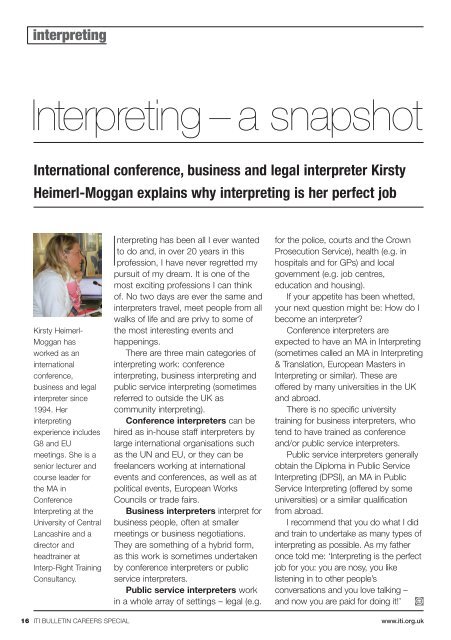14438_ITI_Career_Bulletin_2017_v2 (5)
Create successful ePaper yourself
Turn your PDF publications into a flip-book with our unique Google optimized e-Paper software.
interpreting<br />
Interpreting – a snapshot<br />
International conference, business and legal interpreter Kirsty<br />
Heimerl-Moggan explains why interpreting is her perfect job<br />
Kirsty Heimerl-<br />
Moggan has<br />
worked as an<br />
international<br />
conference,<br />
business and legal<br />
interpreter since<br />
1994. Her<br />
interpreting<br />
experience includes<br />
G8 and EU<br />
meetings. She is a<br />
senior lecturer and<br />
course leader for<br />
the MA in<br />
Conference<br />
Interpreting at the<br />
University of Central<br />
Lancashire and a<br />
director and<br />
headtrainer at<br />
Interp-Right Training<br />
Consultancy.<br />
Interpreting has been all I ever wanted<br />
to do and, in over 20 years in this<br />
profession, I have never regretted my<br />
pursuit of my dream. It is one of the<br />
most exciting professions I can think<br />
of. No two days are ever the same and<br />
interpreters travel, meet people from all<br />
walks of life and are privy to some of<br />
the most interesting events and<br />
happenings.<br />
There are three main categories of<br />
interpreting work: conference<br />
interpreting, business interpreting and<br />
public service interpreting (sometimes<br />
referred to outside the UK as<br />
community interpreting).<br />
Conference interpreters can be<br />
hired as in-house staff interpreters by<br />
large international organisations such<br />
as the UN and EU, or they can be<br />
freelancers working at international<br />
events and conferences, as well as at<br />
political events, European Works<br />
Councils or trade fairs.<br />
Business interpreters interpret for<br />
business people, often at smaller<br />
meetings or business negotiations.<br />
They are something of a hybrid form,<br />
as this work is sometimes undertaken<br />
by conference interpreters or public<br />
service interpreters.<br />
Public service interpreters work<br />
in a whole array of settings – legal (e.g.<br />
for the police, courts and the Crown<br />
Prosecution Service), health (e.g. in<br />
hospitals and for GPs) and local<br />
government (e.g. job centres,<br />
education and housing).<br />
If your appetite has been whetted,<br />
your next question might be: How do I<br />
become an interpreter?<br />
Conference interpreters are<br />
expected to have an MA in Interpreting<br />
(sometimes called an MA in Interpreting<br />
& Translation, European Masters in<br />
Interpreting or similar). These are<br />
offered by many universities in the UK<br />
and abroad.<br />
There is no specific university<br />
training for business interpreters, who<br />
tend to have trained as conference<br />
and/or public service interpreters.<br />
Public service interpreters generally<br />
obtain the Diploma in Public Service<br />
Interpreting (DPSI), an MA in Public<br />
Service Interpreting (offered by some<br />
universities) or a similar qualification<br />
from abroad.<br />
I recommend that you do what I did<br />
and train to undertake as many types of<br />
interpreting as possible. As my father<br />
once told me: ‘Interpreting is the perfect<br />
job for you: you are nosy, you like<br />
listening in to other people’s<br />
conversations and you love talking –<br />
and now you are paid for doing it!’<br />
16 <strong>ITI</strong> BULLETIN CAREERS SPECIAL<br />
www.iti.org.uk



